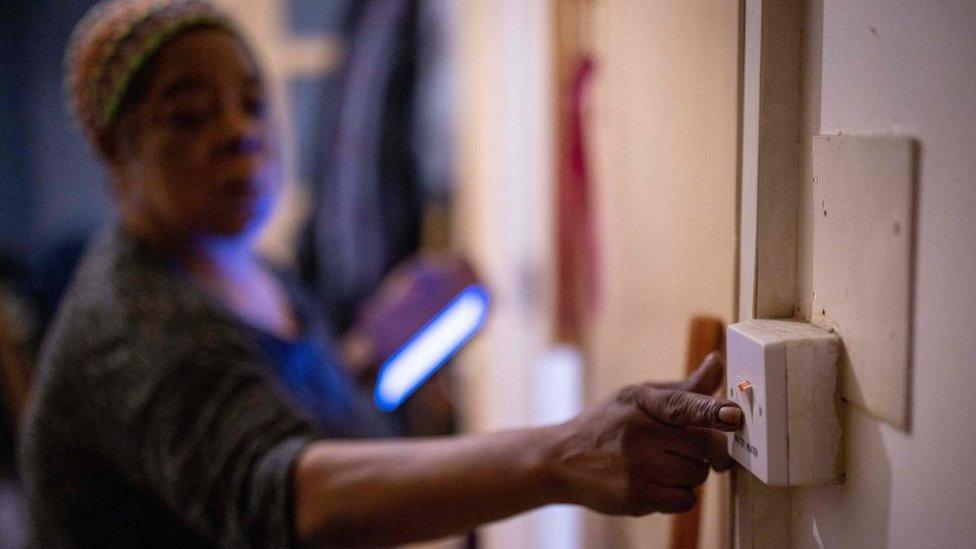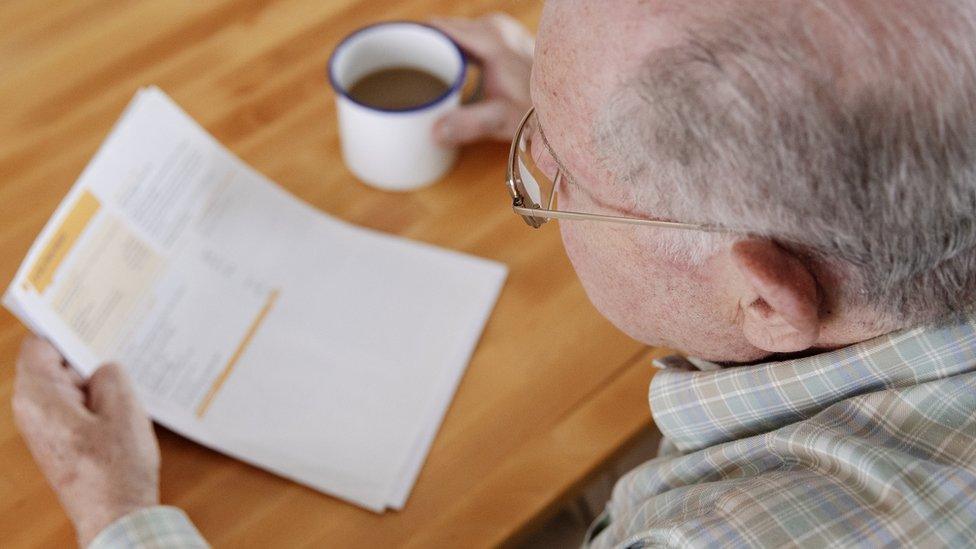The people who wish they had an energy price cap
- Published

Barely a day goes by without more headlines and heartfelt radio phone-ins about how much more we are going to have to pay for our heating this winter.
But what if your bills are not even limited by the soaring energy price cap and could rise even higher as temperatures plummet?
That is the situation for a small but significant number of people who are locked into communal heating agreements where they live.
Oona Shah, 22, is already making preparations for the winter months ahead - and that means spending less time in the shower each day.
The recent graduate lives in north London in a building that relies on communal heating supplies. Her energy bills are not covered by the price cap, the maximum amount energy firms can charge most domestic customers, hence the quick-fire showers.
But why is that?

Oona Shah is bracing for an expensive winter in her flat - where the heating costs will not be limited by the energy cap
Residents on communal heating, or heat networks, are not covered by Ofgem's energy price cap - because they are not buying their gas directly from one of the energy companies that Ofgem regulates. They are classed as commercial systems - despite often being within residential buildings.
Heat networks work as a communal boiler. Hot water is pumped directly to people's homes from a communal source, which can often be found miles away from its final destination. Some homes have individual meters, while others do not.
They are often used in apartment blocks, but also in clusters of social housing. Sometimes it is managed by a third party company, but sometimes by landlords themselves. They naturally seek to pass on the costs to the tenants as wholesale gas prices rocket up - but there is no rule on how they impose these price increases.
Retiree Paul Bolding is already feeling the effect, even as autumn creeps in. The bills for his London home - which uses heat networks - have already risen by 350%.
The flat Paul owns is one of roughly 65 apartments in his development, all of which are supplied with heat from a combined heat and power plant machine in a plant room in the building, he tells BBC News.
The hot water from this communal heating system is then distributed across each flat, but each household has its own meter that records the heat used and bills residents.
In June, Paul says, prices increased from 8.2p per kWh to 36.42 per kWh (plus VAT). He presumes these prices will last a year but as it is not regulated by Ofgem, he fears there is nothing to prevent a further raise. For comparison, the price cap set by Ofgem will be 15p per kWh for gas from October.
Paul says he is mainly frustrated by the lack of transparency and regulation to protect people from "unscrupulous operators" and ensure all energy bills are capped amid rising wholesale gas prices.

Paul Bolding says the whole process is "pretty opaque"
The lack of security of a price cap, even one that is being raised quite dramatically in the coming months, is something that Oona says she finds "very worrying" as she budgets for paying her bills.
As well as the short showers, she is making other small changes to her day-to-day routine, to make savings on other bills. These include switching off unnecessary lights and running her washing machine on cold water, to cut back on her electricity charges.
"London is so expensive already," she says, "it will be hard to justify staying long-term".
It is not just those on the lowest incomes who are frustrated by the apparent price-cap loophole.
Over the last couple of years, a large number of ultra-luxury developments, as well as more affordable and local authority homes, have opted to rely on it as it was seen as a government-backed - and cost-effective - solution.
Some found that the arrangement meant they were paying less for their gas than other domestic users.
That is because developers who built such properties could negotiate their own, often more cost-effective, deals directly with wholesale gas suppliers.
Just last year, the government said, external heat networks were "an essential technology for cutting carbon emissions in a cost-effective way while reducing bills and tackling fuel poverty".
It also went on to pledge £19m to boost funding and investment on heat networks across the country.
'Extortionate bills'
But on Thursday, the National Housing Federation (NHF) urged ministers to take urgent action about the situation with gas prices that has developed since.
The NHF's Kate Henderson told the BBC the majority of residents on heat networks live in social housing and an estimated 72% of those living in social housing are over 55.
Ms Henderson called for the government and energy companies to work together to find a solution to protect vulnerable residents who will not be able to afford "extortionate bills".
Some bills are expected to jump by as much as 500% this winter, and residents have already noticed their bills rising during the warmer months, Ms Henderson said.
WHAT WILL I PAY? What is the energy price cap
SOLUTION? One energy boss's plan
EXPLAINED Why are prices rising so quickly?
The government said it was aiming to help all people affected by higher energy bills.
A government spokesman said: "We know people are worried about rising energy bills, which is why we have confirmed further funding equivalent to the £400 Energy Bills Support Scheme will be available for those not already covered - including a small minority of those using heat networks."
Parliament is also currently assessing a new Energy Bill, which could increase regulation for heat networks.
The proposed legislation would give Ofgem powers to investigate and take action when consumers on heat network agreements appear to be paying "disproportionate" amounts.
That is something that Stephen Knight, director at Heat Trust, is particularly keen to see. His organisation provides independent regulatory advice in the sector, and he warns that even if the government takes that action it will not help people this winter.
He explained any benefits of the proposed bill would not be felt by heat networks consumers for another couple of years. "In the meantime, we have this massive energy crisis where gas prices have gone through the roof."
According to data from the Department for Energy, an estimated 476,951 consumers rely on heat networks for their energy source. But Mr Knight says the number of consumers is likely to be much higher, as these statistics were collated seven years ago.
The energy price cap, set by Ofgem every three months, applies to domestic supply agreements in England, Wales and Scotland, and will be £3,549 for a typical household from October. Businesses, including restaurants, have called for the cap to be extended to commercial supplies.

Find out why food prices are also on the rise.
Watch now on BBC iPlayer (UK only).

- Published1 September 2022

